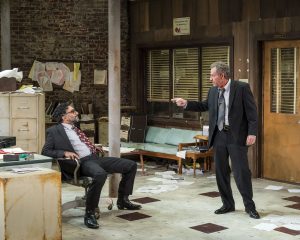This Glengarry Glen Ross a Soft Sell

Manu Narayan and James Sutorius in Glengary Glen Ross (Photo by Craig Schwartz)
When David Mamet’s Glengary Glen Ross first exploded on the stage, its nonstop profane dialogue left many in a state of shock. Some 28 years later, this now ubiquitous vocabulary gurgles from the 7-year-old youngsters on Comedy Central’s South Park as well as from the cuddly, singing puppets from Broadway’s Avenue Q.
The current La Jolla Playhouse production of Glengary Glen Ross reminded me that coarse language is the least distressing aspect of Mamet’s Pulitzer Prize-winning play about the internecine office warfare of five rapacious Chicago real estate agents. I would list mendacious manipulation, contemptuous regard of humanity, and unrestrained hubris as the diabolical Trinity of this drama.
If Director Christopher Ashley had assembled a cast that exhaled this sulfurous theology with equal conviction and skill, this production could have been wickedly glorious. Instead, its temper and drive wavered inconsistently throughout its intermission free two acts.
However, whenever Manu Narayan as the eerily captivating Ricky Roma was on stage, the play soared. Narayan not only delivered a pitch-perfect take on the character of this devious, narcissistic hawker of worthless real estate, but he vigorously telegraphed the terse, staccato scan of Mamet’s prose. Roma believes he is larger than life, and Narayan made even the slightest gesture stoke his smarmy illusion.
As Dave Moss, a more craven version of Roma, James Sutorious proved equally confident in the patented Mamet sneer and humiliation two-step, and his pace—like that of Narayan—was brisk and dismissively curt.
Through craft and collusion with management, Roma has supplanted an older colleague, Shelly Levene, as the company’s top salesman, and we watch this potential Willy Loman flail as he sees his glory days and his steady income ebb. Unlike Loman, Levene still has his wits about him and believes he is about to make a comeback. Peter Maloney brought abundant energy to this pivotal role, but it was too much surface exasperation and not enough angst over how his extended sales slump was undermining his self-respect. In short, Maloney was long on kvetch but short on despair, and this depleted the energy Narayan was continually pumping into the production.
Ray Anthony Thomas made George Aaronov, the office’s low salesman-on-the-totem-pole overly clueless: his blank facial expressions made him look like a character who wandered in from American Buffalo, an earlier Mamet play about scheming lowlifes. As the young upstart office manager John Williamson, Johnny Wu proved too meek and almost accommodating. Jeff Marlow’s simpering take on James Lingk, the patsy who is Roma’s latest sales victim, worked well, especially as he vainly attempted to get his downpayment check returned the morning after.
Mat MacNelly’s police officer, Bayden, whose gruff offstage interrogations of each salesman about the robbery that drives Mamet’s slender plot leave them outraged, gave the robotic impression of a pot-smoking high school hall monitor. It was difficult to imagine him striking a scintilla of fear into these hardened agents.

Set design by Todd Rosenthal (Photo by Craig Schwartz)
Todd Rosenthal’s shabby, realistic set provided the perfect backdrop and commentary on these ethically squalid businessmen. At first the dimly lit (apt lighting designed by David Lander), massive Chinese restaurant banquettes surmounted with a huge aquarium of darting tropical fish seemed impressive, but as the first act scenes progressed, we noticed that the worn uphosltery was clumsily patched with cheap tape.
The second act sales office, with its battered and rusted file cabinets, creaking, mismatched desks and chairs and other furniture discards impersonating decor said everything about these oblivious alpha males. Costume designer Toni Leslie James wisely made each agent’s attire reflect his sales prowess: Roma and Moss wore dark, stylish, tailored suits, while the others appeared rumpled and cheap. Levene’s baggy, light brown plaid three-piece suit classically screamed failure.
Sunday’s New York Times mentioned that Glengarry Glen Ross will be revived on Broadway this season, so perhaps the La Jolla Playhouse was prescient in mounting this production. Ashley miscalculated, however, that this evil parable would simply play itself. He should have been as cunning and relentless at Mamet—or Ricky Roma.
[box] David Mamet’s Pulitzer Prize-winning Glengarry Glen Ross, Running September 18 – October 21, 2012, in the Sheila and Hughes Potiker Theatre at La Jolla Playhouse.
Peter Maloney as “Shelly Levene,” Jeff Marlo as “James Lingk,” Matt MacNelly as “Baylen,” Manu Narayan as “Richard Roma,” James Sutorius as “Dave Moss,” Ray Anthony Thomas as “George Aaronow,” and Johnny Wu as “John Williamson.”
Christopher Ashley, director; Todd Rosenthal, set design; Toni Leslie James, costume design; David Lander, lighting design; David Corsello, sound design; Shirley Fishman, Dramaturg. [/box]

Ken Herman, a classically trained pianist and organist, has covered music for the San Diego Union, the Los Angeles Times’ San Diego Edition, and for sandiego.com. He has won numerous awards, including first place for Live Performance and Opera Reviews in the 2017, the 2018, and the 2019 Excellence in Journalism Awards competition held by the San Diego Press Club. A Chicago native, he came to San Diego to pursue a graduate degree and stayed.Read more…


